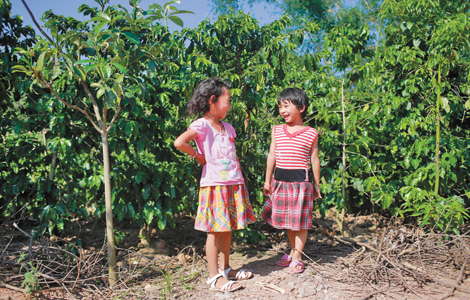The task of better feeding China
Updated: 2013-06-22 08:24
By Zhu Jin (China Daily)
|
|||||||||||
The central government, on its part, should take measures to ensure adequate supply of labor for agriculture, because attracted by the lure of higher wages in urban areas, rural workers, particularly the young and educated, have been making a beeline for cities leaving an aging labor force in rural areas. If this trend continues, it will deprive the agricultural sector of the modern, skilled workforce it needs for large-scale farming with modern machinery and equipment, which would increase agricultural output. Without modern large-scale farming, productivity will be severely constrained.
The central government has instituted a policy to prevent further loss of agricultural land. But the economic downturn will put further pressure on local authorities to use land for development to increase their revenues. So the central government has to ensure that they don't cross the red line.
Climate change, too, is putting pressure on precious land and water resources. While the area of cultivated land in China has decreased rapidly in recent years, the quality of much of the remaining arable land has been deteriorating, with 70 percent classified as low-yield farmland, according the OECD. Affected by global warming, reduced rainfall, depletion of surface water and groundwater levels, China's northern region, its main grain belt, faces serious soil erosion. On top of this, soil in many areas has been contaminated with sewage, garbage, industrial effluents and other pollutants.
The impact of climate change is also evident in declining and increasingly variable water sources. With relatively low levels of precipitation and high annual variations in rainfall, China faces serious water shortage. With the effects of climate change becoming more pronounced, the water available for agriculture could reduce further threatening the stability of food production.
Providing enough food for the Chinese people has implications for the international market, which is a question of great importance not just to China, but also to the rest of the world.
"In an integrated world economy, rising food prices will become the world's rising food prices. China's land scarcity will become everyone's land scarcity. And water scarcity in China will affect the entire world," says Lester Brown, president of the Earth Policy Institute, in his book Who Will Feed China?
But with China's population projected to grow by about 9 percent, until it peaks at 1.46 billion around 2030, the question is: Can China increase its agricultural output to meet the demand and achieve self-sufficiency?
China needs to design a policy to suit its domestic conditions and improve its support for sustainable agriculture. The government's focus is on resolving asymmetry and imbalance between the huge number of smallholders and the large Chinese market. But it also has to strengthen the management of land and water resources and address the effects of climate change on agricultural production.
The author is a journalist with China Daily. E-mail: zhujin@chinadaily.com.cn
(China Daily 06/22/2013 page5)
Related Stories
Major source for Beijing water plan 'polluted' 2013-06-22 08:22
Pollution crimes to be severely punished 2013-06-19 21:53
'Legal weapons' against pollution offenses 2013-06-19 07:47
Less carbon, less pollution 2013-06-18 07:47
China shows resolve, action against air pollution 2013-06-15 17:14
10 steps taken to curb air pollution 2013-06-15 07:47
Today's Top News
France wants more Chinese investment
FM: China rejects US' claim on Snowden
Public interests Party's top priority
Overseas sellers upbeat on China
PBOC will act 'if necessary'
4 Chinese killed in Papua New Guinea
'Heavy losses' if China-EU solar sector talks fail
Riots in Xinjiang kill 27
Hot Topics
Lunar probe , China growth forecasts, Emission rules get tougher, China seen through 'colored lens', International board,
Editor's Picks

|

|

|

|

|

|





